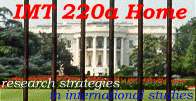Syllabus
Information research and problem solving in the context of International Relations.
This course will focus on the identification of information needs, information seeking strategies and the fundamental skills for executing them, evaluation of information sources for specific purposes, and reflection on the process of research in International Relations. The course will explore major information research tools in the discipline, develop strategies for using both print and electronic sources, and discuss the changes technology is making in the fields of International Relations. All course work will focus on research needs for SIS 495, the Task Force course in the Jackson School of International Studies.
Among the concepts addressed will be:
Grading Policy
This is a 3 credit, graded course. Grades will be calculated on a 100 point scale and assigned upon completion and evaluation of the following:
The distribution below
draws on the UW grading system.
| 4.0 = 98-100 A | 2.8 = 83 B- | 1.6 = 71 C |
| 3.9 = 95-97 A | 2.7 = 82 B- | 1.5 = 70 C- |
| 3.8 = 93-94 A- | 2.6 = 81 B- | 1.4 = 69 D+ |
| 3.7 = 92 A- | 2.5 = 80 B- | 1.3 = 68 D+ |
| 3.6 = 91 A- | 2.4 = 79 C+ | 1.2 = 67 D+ |
| 3.5 = 90 A- | 2.3 = 78 C+ | 1.1 = 66 D |
| 3.4 = 89 B+ | 2.2 = 77 C+ | 1.0 = 65 D |
| 3.3 = 88 B+ | 2.1 = 76 C | 0.9 = 64 D |
| 3.2 = 87 B+ | 2.0 = 75 C | 0.8 = 63 D- |
| 3.1 = 86 B | 1.9 = 74 C | 0.7 = 62 D- lowest passing grade |
| 3.0 = 85 B | 1.8 = 73 C- | . |
| 2.9 = 84 B | 1.7 = 72 C- | . |
Required Readings
SIS 495 will require you to read many documents critically and intelligently. It is not the intent of IMT 220a to unnecessarily add to this load. Rather, supplemental readings will be selected with an eye to their contribution to your career development. What course readings are deemed essential to this objective are included in the class schedule as well as listed under Reserve Readings. All required readings are available electronically.
© 1999 University of Washington || Last updated: December 15, 1999
Contact the instructor at: jwholmes@u.washington.edu
